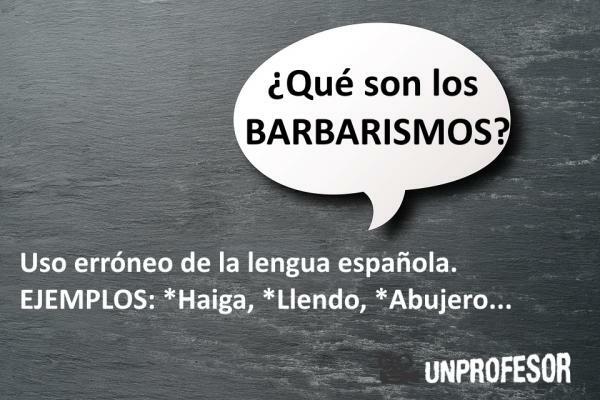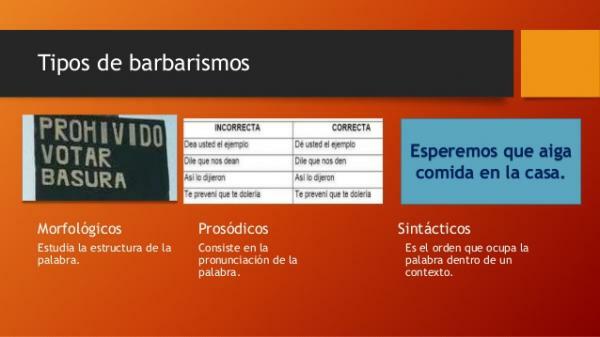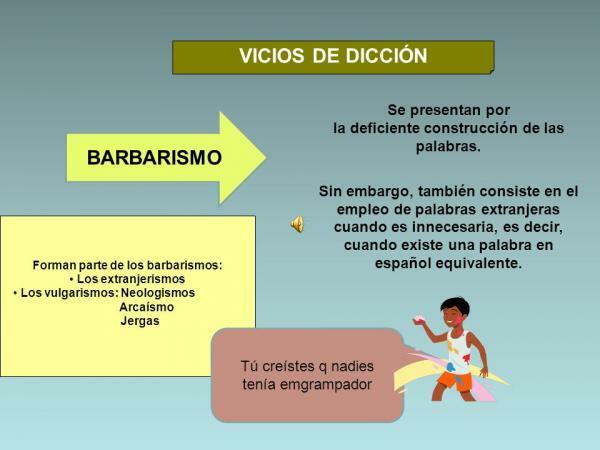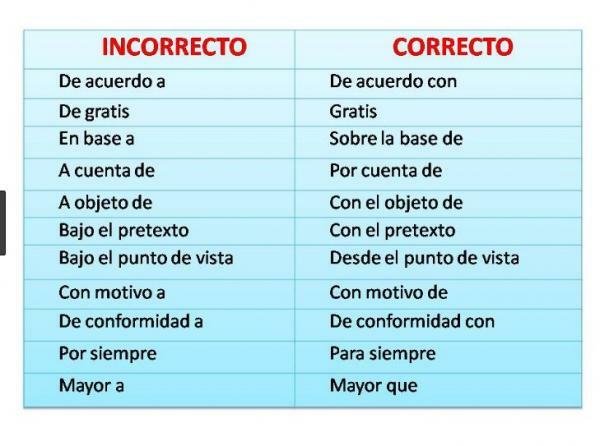BARBARISMS: definition and examples

Do you want to know what are barbarisms in Spanish? It is the name we give to those words we use without respecting the stipulated rules by the tongue. Therefore, they are incorrect words that are used in the oral language and that, normally, are typical of speakers with less linguistic knowledge or with little training. In this lesson from a TEACHER we are going to show you the definition of barbarism with examples So that you can better understand what we mean when we talk about this linguistic phenomenon. In addition, we will also discover the different types of barbarism that exist in Spanish. We started the lesson!
Index
- What are barbarisms: simple definition
- Types of barbarisms in Spanish
- Characteristics of barbarisms
- 12 examples of barbarism in Spanish
What are barbarisms: simple definition.
To know the definition of barbarism it is important that we bear in mind that this word has a long tradition behind it. It is a concept that already
used by ancient greeks to refer to those other peoples who spoke languages other than Greek or who spoke Greek without respecting the rules. These peoples were the "barbarians" and it is from this ancient conception that the current meaning of "barbarism" comes from.Therefore, nowadays, barbarisms are those terms that we use in Spanish and that They are not correct according to the Royal Spanish Academy. However, we must be very careful with this issue because Spanish is a living language and, therefore, it may be that over the years something that was previously considered incorrect is now admitted by the RAE.
Here we leave you the definition of barbarism that we find in the Dictionary of the Royal Spanish Academy:
"It is an incorrectness that consists in pronouncing or spelling words wrong, or in using improper words"
The cause of barbarism in Spanish is many and varied. For example, it may be due to lack of knowledge of the speaker, something that causes him to misuse the language. It may also be that there is confusion when using words or phonetic forms, especially in areas where those with languages in contact (Catalan / Spanish, Galician / Spanish, Basque / Spanish, French / Spanish, etc).

Image: UAEH
Types of barbarism in Spanish.
Now that we know the definition of barbarism, we are going to talk about the different classes that exist. And it is that depending on the type of incorrectness that is being carried out, we find different types of barbarism that is worth knowing. Here we discover them.
Prosodic barbarisms
One of the types of barbarisms that exist are what are known as prosodic, that is, they are those errors that refer to the diction or the way of pronouncing sounds. Some examples of barbarism of this type would be:
- Pronounce "going" instead of "going"
- Say "haiga" instead of "haya"
- Pronounce "insect" instead of "insect"
- Etc
Syntactic barbarisms
In the case where sentences are created in which there are syntactic errors such as, for example, lack of agreement, errors in the construction of sentences, idioms, etc., is when we speak of syntactic barbarisms. Some examples are the following:
- Using a "what" in the sentence in the wrong way (queísmo): "* Come before the sun goes down" is wrong. The correct thing to do would be "Come before the sun goes down."
- Misuse of the impersonal: "* There were many books" is wrong. The correct thing is in impersonal, that is to say, "There were many books".
- Etc.
Spelling barbarisms
And finally, another of the types of barbarisms that are committed in the Spanish language are those that refer to those in which they are committed spelling mistakes, both when writing words and when using words in the wrong way. Some examples of these barbarisms are:
- Yesterday * I walked 5 kilometers (The correct thing is: Yesterday I WALKED 5 km)
- You * told me you would come (The correct thing is: You TOLD me you would come)
- I am missing a * hole in my belt (The correct thing is: I am missing a hole in my pants)
- Etc

Image: Slideplayer
Characteristics of barbarisms.
In order to better understand the definition of barbarism and its global concept, it is important that we stop to learn about the most outstanding characteristics of this linguistic phenomenon. It is essential to note that the word "barbarism" can have negative connotations and, immediately, believe that only people with low training can make such mistakes. But the truth is that the vast majority of speakers he commits some barbarism in his daily speech.
There are many cases of linguistic barbarism and they have little to do with the education of each speaker. It is possible that for sociolinguistic reasons, people have confusion or doubts when it comes to using the Spanish language correctly and, therefore, these barbarisms are committed.
The characteristics of the most common barbarisms are as follows:
- They appear during childhood: when they are learning to speak, barbarisms may appear that appear due to the lack of knowledge of the language
- Common in irregular verbs: in the event that a verb is conjugated irregularly, it is common for barbarisms to appear. It is the case of "I * sepo" instead of "I know"
- Errors when forming plurals: It may be that there is confusion when creating plurals in Spanish, such as "* pieses" instead of "pies"

Image: Slideplayer
12 examples of barbarism in Spanish.
And to finish the lesson, we are going to talk to you about examples of barbarism that will help you better understand all the theory that we have just learned. Here we leave you one complete list with different examples of barbarisms that are common in the Spanish language:
- Yesterday * you came late (the correct thing would be you came)
- Are you coming to the * opening of the theater? (the correct thing would be INAUGURATION)
- I really want a * picsa! (the correct thing would be PIZZA)
- My * feet itch (the correct thing would be FEET)
- I like * both two (the correct thing would be BOTH)
- You just have to * pour the milk into the saucepan (the correct thing would be POUR)
- I was very excited (the right thing would be EXCITED)
- * There were many children (the correct thing would be HUBO)
- I * know many things (the correct thing would be I KNOW)
- Yesterday I * stumbled in the park (the correct thing would be I STROPPED)
- I hope * there is a place to park (the correct thing would be THERE)
- Wait for this * to go! (the correct thing would be GOING)

Image: Vices of language
If you want to read more articles similar to Barbarisms: definition and examples, we recommend that you enter our category of Orthography.
Bibliography
- Barrio, T. (1986). Dictionary of barbarisms, neologisms and foreign words. Editorial Concept.
- Seijas, J. (1890). Dictionary of everyday barbarisms. Kidd y cia., Limited.

